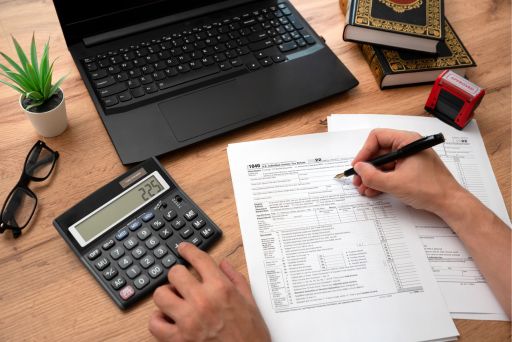Nothing is certain except death and taxes, or at least that’s how the saying goes. But it’s the uncertainty of how much is owed, and what to do if you don’t have enough to pay, that seems to bring a lot of worry and questions when it comes tax time. Today, we wanted to shed a little light on the question, “What should I do if I owe the IRS money?”.
The Do’s and Don’ts of Owing the IRS Money

The Don’ts
- panic, be afraid, or delay filing
- decide to put it off
- don’t try to solve the problem alone – ask for help or additional information
The Do’s
- file a tax return on time to avoid additional penalties and interest
- pay what you can by tax day
- check into payment options or talk to a certified accountant
Creating Your Strategy for Tax Payment
It’s fairly clear that you shouldn’t panic, but we understand that it’s easier said than done. So lets get to building you a strategy filled with action items so you can pick the best route for you and your small business in working with the IRS and getting them the money you owe. You’ll want to submit your paperwork for your taxes and pay what you can so you can decrease the overall interest and the penalty charges.
If you can’t meet the filing deadline, then request an extension to file. This doesn’t mean you’ll get an extension to pay, taxes are still due on the original date, but it will provide you with lesser penalties for late filing. Remember, the best thing you can do is get your finances in order, file your tax returns, and then get ready to work on what comes next – figuring out how to pay what you owe while keeping the penalties and interest owed to a minimum. Now lets talk payment options.
IRS Payment Options
What you might not know is that the IRS actually provides quite a few options for making payments, even when you’re late or can’t pay the full amount. There are 3 basic payment options. Each payment option is linked directly to the IRS pages outlining the details and forms you’ll need to submit, but you’ll want to read on to find the one that fits your circumstances best.
Online Payment Agreement
There are a few different options for online payment plans, so you’ll have to apply for this option and make sure you’ve met the standard requirements. For businesses, the IRS provides long-term payment plans (you’ll pay in installments). Here’s what you’ll need to do to qualify:
- you’ve filed all required returns
- owe less than $25,000 in combined tax, penalties, and interest.
If you’re a sole-proprietor or independent contractor you’ll apply for your payment plan as an Individual.
Keep in mind that a payment plan comes with some strings. There are fees that will be added to your tax bill for this option and are outlined upon approval.

Offer in Compromise
Offers in Compromise provide you with the chance to settle your tax set for less than the full amount you owe. Each application is considered on it’s unique circumstances which include: your ability to pay, income, expenses, and asset equity. Most applications are approved when the offered amount represents the most the IRS can expect to collect within a reasonable period. You’ll have a variety of forms you’ll need to submit and you’ll find those and be able to read all the fine print on this option here.
Temporarily Delay Collection
Temporarily Delay Collection means the IRS has determined that you’re unable to pay any of your tax debt. It DOES NOT mean that you’re debt free, rather that you’re collection has been put on hold until your financial situation improves. This option DOES NOT delay interest on the amount you owe, but adds the penalty fees and additional interest to your total owed. The IRS also has the right to file a Notice of Federal Tax Liens to protect their interest in your assets, so you’ll want to consider how this option will effect your abilities to run and grow your business before you take it.
When to Look for Accounting & Tax Help
The last thing you want to do is dive into making decisions without having all the information you need. Taxes are tricky – there are a lot of specifics and we totally get that dotting and crossing financial i’s and t’s might not be your thing. Racking up debt or having a stack of bills isn’t something you want to do either. So when do you take on a professional bookkeeper for your business or hire a certified accountant to file your taxes?
Seek out a professional accountant and see if they provide consultation services. All you might need is to sit down with an accountant once or twice a year. They know the ins and outs of tax codes, and can help you with a long-term financial strategy, both to get you out of debt, and also in working to pay off any overdue taxes to the IRS. Make sure to keep a list of questions that you have regarding your finances and taxes so you’re money is well spent.
Have additional questions or want to look into working with us? We’d love to talk with you – contact us here.

FAQs about Owing the IRS Money:
What should I do if I owe the IRS money?
Act promptly. File your tax return on time to avoid penalties and interest. Pay what you can by tax day. Seek professional advice if needed.
Can I delay filing my taxes if I can’t pay?
You can request an extension to file, but taxes are still due on the original date. However, this can reduce penalties for late filing.
What payment options does the IRS offer?
The IRS provides online payment agreements, offers in compromise, and temporary delay collections. Each has its own eligibility criteria and implications.
How do online payment agreements work?
If you owe less than $25,000 in combined tax, penalties, and interest, you may qualify for a long-term payment plan. Fees apply, and all required returns must be filed.
When should I seek accounting and tax help?
- Consider consulting a professional accountant if you’re uncertain about tax matters or need help with financial planning. They can provide valuable guidance and ensure compliance with tax codes.

